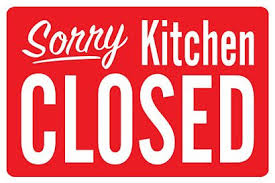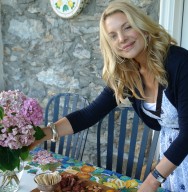Your Kitchen is Closed
 My clients daughter, Gracie, is a snacker. Gracie was raised with frequent snacks at school, and at home she gets a snack before dinner, and one at bedtime too. She’s not unusual.
My clients daughter, Gracie, is a snacker. Gracie was raised with frequent snacks at school, and at home she gets a snack before dinner, and one at bedtime too. She’s not unusual.
We’re a nation obsessed with snacking. Especially our kids. Maybe it’s aggressive food advertising, or the popularity of processed foods, or the accessibility of any food we want at any time of year.
Gracie grew up this way, ending her day with a snack, and now it’s her normal eating style. It’s a habit, and habits can be hard to break. Grace’s mother is concerned; she sees her daughter putting on weight, and mindlessly eating every night, even after a substantial dinner.
Another client of mine, Emma, is a snacker as well. But Emma didn’t grow up that way. She began snacking at night when she started a new, high pressure job. She eats healthy foods all day long, and in fact loves good food and prepares a lot of it herself. She begins her day with a green smoothie, has salads for lunch, healthy proteins, and dinner is often gourmet cooking and delicious. The after-dinner snacking is her downfall.
Emma starts roaming the kitchen at about 8pm, searching for just one more snack, and this habitual behavior continues until she goes to bed. She couldn’t recall the last time she’d not had a snack at night, and she was feeling really frustrated that her healthy days were followed by unhealthy food binges.
When we went through Emma’s foods, she seemed genuinely happy with her menus and eating style. She didn’t sound deprived, and her meals sounded pretty amazing. So why was Emma grabbing more later, after her healthy and substantial dinner?
Emma and I got into a Q and A about what was feeding this compulsion, and we discovered that her foods at night had nothing to do with cravings, or hunger, or loneliness.
Emma wanted a reward. She wanted something to celebrate, to party a little, to tell herself, “Hey, you worked really hard today, and kicked some you- know- what! You deserve this! Have at it, honey!”
And she did. The problem was that the next morning she felt like she’d failed. Failed at feeding herself with joy, for health. Failed at self-control, and what had been a reward the night prior, now felt like a punishment.
It was an awful feeling.
I got both of these scenarios. They’re understandable. Gracie was raised that way, and Emma was really in search of something else.
What did we do?
We closed the kitchen. We closed it down, shut the door, turned out the light, and left the vicinity.
For young Gracie, the dark, closed kitchen meant that the day was over. Time to take your bath, get in bed, and read.
For Emma, the dark, closed kitchen was unwelcoming. No reward coming. Emma had to seek out other rewards; little things like a lavender salt bath, or a movie on her lap-top in bed, or a long phone call to her friend in Cali.
The kitchen was closed.
Gracie adjusted pretty quickly, and went with the program. It made sense to her, and she really wasn’t hungry.
Emma adapted, respecting the closed doors, and the peacefulness of a different room. The pressure was off. No more searching for food.
The kitchen was closed.
What about you? Are you a creature of the night, in search of something in your cupboard, or refrigerator, or freezer? Can you close your kitchen down?




